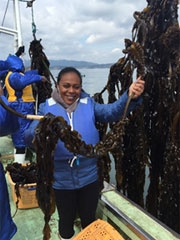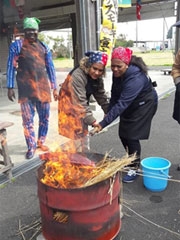- Home
- Countries & Regions
- Oceania
- Vanuatu
- Topics & Events
- Training on Gender and Small Scale Fisheries Entrepreneurship for Fishing Community Development
Topics & Events
November 7, 2019
Training on Gender and Small Scale Fisheries Entrepreneurship for Fishing Community Development
Hello, my name is Lucy Andrea Joy and I work as the Principal Data Officer for the Vanuatu Department of Fisheries. I took part in the JICA funded Training in JICA Yokohoma in Japan for two Months, from the 24th of February to the 13th of April, 2019.
The Program's course name is; ‘Gender and Small Scale Fisheries Entrepreneurship for Fishing Community Development' and it covers a range of topics including poverty, availability of resources, environment conservation, education, sanitation technology, Fish Processing, Aquaculture, capture fisheries and fish marketing. The course provided many new experiences with Japanese Culture, such as the tutelage of sushi making, kimono dressing and experiencing life in Japanese traditional homes. However, the main focus of the course is to look at gender issues that have not been well acknowledged in the development of small scale fisheries in fishing communities. Such issues can be classified as poverty and inequality of income distribution and result necessity of promoting small scale business in fishing communities under gender equality through the creation of small-scale businesses appropriate to the natural, social and economic conditions of the communities.

The overall goal of training is to improve the livelihood of small scale fishing communities through the implementation of a formulated project plan.
My proposed project plan, conceived during study in Japan, targeted the Paunagisu village in North Efate and bears the name- Paunagisu Women's Fisheries Development Project.
The Purpose of this project is to develop and implement a small scale business plan suitable for the fishing community where there is improvement in the generation of income and where women can be economically empowered.
The project plan aims to increase women's income in fish processing sales and keep the women's fish processing group established and functioning. Though the project is in preliminary form, it has many promising factors to take into consideration.
In Japan, we visited many successful fishing businesses which were owned and operated by women such a Pearl Farming Women's Cooperative, a womens diving instructors house, a Seaweed processing business, a seafood processing facility, a sushi restaurant, and an oyster farm production all run and operated by women.
If Japanese women can lead and operate a business in fisheries, then it should not be hard for us as fishing communities ourselves to model upon their footsteps.
I would like to thank JICA for being supportive in funding the educative trip which will bring benefit to improving our country's small-scale fisheries entrepreneurs and encourage gender equality for fishing community development within our economy.
- About JICA
- News & Features
- Countries & Regions
- Our Work
- Thematic Issues
- Types of Assistance
- Partnerships with Other Development Partners
- Climate Change / Environmental and Social Considerations
- Evaluations
- Compliance and Anti-corruption
- Science and Technology Cooperation on Global Issues
- Research
- JICA Development Studies Program / JICA Chair
- Support for the Acceptance of Foreign HRs / Multicultural and Inclusive Community
- Publications
- Investor Relations
